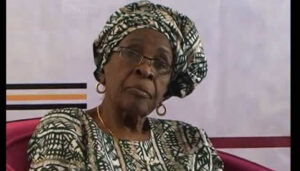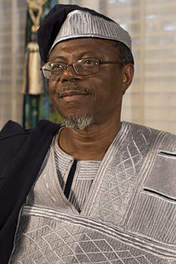By Toyin Falola
The first day, February 13, 2023, of the conference in honour of Professor Bolanle Awe saw us roll several events into a single day — possibly another stretch in addition to the diligent work the team of conveners, conference secretariat, and volunteers have been doing for months now. Although circumstances eventually restricted me from being physically present at the conference, I was there in spirit and through the provisions made by technology, and I could not be happier about the turn of events on the first day of the conference.
Drawing from the panel session I joined virtually, chaired by Prof. Olasope, the first round of panel sessions went smoothly. Prof. Olasope’s panel regrouped scholars that presented papers on different topics, all coming back to the same focal point. The paper explored history documentation from below, which offered enlightening insights on the importance of documenting women’s history across several social classes without restricting documentation to the elite alone. This also expatiated on the authors’ works in documenting the history of market women in Nigeria and tracing trends in women’s contributions to the development of societies in Nigeria, beyond the few singled-out and recognized women as we had in the earliest documentations of Nigerian women’s history. The paper also exposed the unequal recognition of Nigerians by the Nigerian constitution, a recognition that is especially glaring along gender lines. The paper further brought to the fore how pro-women advocacy and campaigns in Nigeria have met with stiff resistance within the corridors of power, especially the National Assembly, the most vital organ of government needed for formulating new laws or amending old ones that are not favourable to the existence of Nigerian women living in our outside the country. The gross gender disparities in some privileges accorded Nigerian men by the constitution without their female counterparts enjoying, show that the country is light years away from being a level playing ground for the growth and development of all.
 Prof Awe
Prof Awe
Undoubtedly, the Women’s Research and Documentation Center (WORDOC), an organization co-founded by Professor Bolanle Awe, has immensely benefited virtually every researcher on female and gender-related issues in Nigeria. It was, therefore, not surprising to see that the WORDOC was the focus of one of the research papers presented at the first round of panel sessions, thereby recognizing the work of the institution and also proferring solutions to aspects to which the institution’s work and influence could be further strengthened.
One notable thing that was immediately noticeable during the session was that presenters deployed several research methodologies to arrive at their final paper. There was fieldwork, focused groups, and secondary research, among others. The participants’ use of several research methodologies allowed for a varied and wholesome conference. Another commendable thing from the first panel session I joined was the engagement of the participants.
In planning for this conference, we desired to make it as engaging and participatory as possible, so much so that even non-presenters would fully participate, critique, and peer-review the works of the presenters. This was adhered to by the members of the first panel through the questions, comments, and suggestions they brought forward. Therefore, there is no doubt that the other panel sessions at other centres went as smoothly as the one I joined, with enough participation from presenters and attendees. This is a fundamental goal of any conference, and I am happy we achieved it.
A life lived in service to others will not only be a life well-spent, but it will also be a fulfilling life. I can tell because, to some extent, I have been there. However, this is not about me today; it is about Professor Bolanle Awe, who lived and continues to live her life in service to humanity and different capacities — even at her age. Through the opening ceremony, this saying was made manifest yet again. It takes extraordinary achievements and contributions for an academic to be the beloved of two of Nigeria’s greatest universities — the University of Ibadan and the University of Lagos — as well as the National Academy of Letters and the MacArthur Foundation. These institutions, among others, can never joke with anything that concerns Professor Bolanle Awe, and she is worth all the recognition and respect they accord her, for she also lived her life and gave her intellectual and other resources in service to these institutions and others. I was pleasantly shocked when one of the contributors mentioned that Professor Awe worked as an editor for a book as recently as last year. One begins to wonder how loyalty and dedication have formed the core of the existence of people like the Matriarch Awe.
The opening ceremony also affirmed the claim that Professor Awe has been a multi-generational and multi-disciplinary influence and mentor. She has influenced the life of many, from the Chair of the ceremony, Erelu Bisi Adeleye-Fayemi, to the Keynote Speaker, Professor Olabisi Aina, to Professor Adeboye, to Professor Bola Sotunsa, and Dr. Omotoso. These seasoned academics and researchers in history and women’s studies did not start their academic and research careers simultaneously, yet, they can all allude to how beneficial and life-changing their first encounter with Professor Bolanle Awe was.
Professor Awe came to the scene when even education could not have made gender-based discrimination less prominent, as there were a few indigenous women in the academia at her time. Given these conditions, Professor Awe was among the few pathfinders that walked through the thorn-filled and overgrown bush, clearing a pathway for others to come. And to be a part of the pathfinders meant that they had to do things the tough way, learning to be fierce enough to withstand and confront the status quo. This is why many know Professor Bolanle Awe as the vocal academic who has spoken out to criticize known cases of discrimination against women and the distortion of history, especially regarding women. It cannot also be forgotten how she took many under her wings and tutelage, committing herself to raise another fierce and relentless generation of women that would advance the documentation of women’s history in Nigeria. The new generations that Professor Awe dedicated her life and resources to raise are also giving back to society in good measure, including raising newer generations of committed historians.
Listening to Professor Olabisi Aina recounting her experience under the tutelage and mentorship of Professor Bolanle Awe brought to the fore the need to ensure that mentorship in the academia is holistic and altruistic — for many that have worked with Professor Awe and for those she has mentored, she took them also as daughters and sisters, people with whom she shared a common history and baseline issues; people whom she could relate to their struggle. And to that end, she was committed to supporting them for academic success; she likewise showed support, love, and understanding — qualities that must have reassured her mentees in their trying times, ensuring them the confidence to carry on their tasks.
Today, it is also vital that the mentorship given to young researchers and academics — especially women — is wholesome and holistic enough to support them beyond academia while also ensuring that it is altruistic in that there is no ulterior motive or forcefully expected benefit for the mentors.
If we fill all the drums in the house with drinks and alcohol and have several bowls of amala to boot, if there are no partakers of the meal, then it can be concluded that all the efforts and resources put into the preparation of the meal were to waste. On that note, special thanks go to everyone that participated on the first day of the conference and made it a success. First on the list is the Chief Host, the Vice-Chancellor of the University of Ibadan, Professor Kayode Adebowale, who honoured the celebrant by gracing the conference’s opening ceremony. Immense thanks also go to the Deputy Vice-Chancellors and the other principal members of the University that were present. It is also important to appreciate Professor Awe’s family members and other participants who did not only grace the opening ceremony but also came to honour to whom it is due.
The recount of the conference’s first day will not be complete without touching on the examination of Professor Awe’s cross-disciplinary contributions, especially those that were outside the academia and to such organizations as the MacArthur Foundation — for which she served as the Country Director, a role through which she extended her focus to feminist causes and how to battle gender issues especially as they relate to women.
The engagement between eminent female researchers and academics and the junior faculty and intending female academics, as moderated by Professor Oduwole, served its purpose wholesomely. I applaud the panelists on how they gave seasoned responses based on experience to questions on the biggest issues and questions that most likely bother junior and intending female academics in Nigeria.
This recount is expected to serve two purposes — first, it will serve as a summary for those who neither attended the first day of the conference physically nor virtually. Second, this will also serve as an extended invitation to join us as the presenters and participants continue to contribute to the body of work on history and academia on the second day of the conference.


